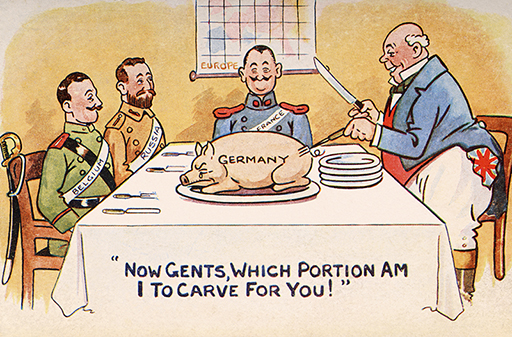1.1 Propaganda posters
Posters like the examples in Section 1 would have been displayed in public places and were an effective propaganda tool for the German government, alongside newspaper articles that confirmed the impression of Germany’s innocence. As a result, Germans were convinced that Germany had been attacked and did not start the war, a conviction that would make it impossible to accept the Treaty of Versailles. The statement about God’s support is important, not least because the belief that God was on one’s side was widespread and not restricted to Germany.
Activity 1 Finding primary sources online
The website ‘German History in Documents and Images’ has documents that could be used to inform a discussion about propaganda and what Germans considered the reasons for the outbreak of the war. If you are unfamiliar with this resource, turn to Session 5 [Tip: hold Ctrl and click a link to open it in a new tab. (Hide tip)] , where it is discussed in more detail. For this activity find a document that supports the argument that Germans were convinced they had been attacked in 1914.
Comment
One document included in this database is Kaiser Wilhelm’s announcement to the German people, below, which stresses the defensive nature of the war and illustrates the points made above.
Berlin, August 1, 1914 I thank all of you for the love and loyalty that you have shown me these past days. These were serious days like none before them. Should there be battle, all political parties will cease to exist! I, too, have been attacked by one party or another. That was in times of peace. It is now forgiven with all my heart. I no longer think in terms of parties or confessions; today we are all German brothers and only German brothers. If our neighbors want it no other way, if our neighbors do not grant us peace, then I hope to God that our good German sword will emerge victorious from this hard battle.(German History in Documents and Images, GHDI - Document (ghi-dc.org))
The Allies’ decision at Versailles to blame Germany (in the infamous Article 231) seemed to settle the matter as far as the victors were concerned, but in Germany it was never accepted. Although Germany emerged politically fragmented and disunited from the war, there was one important agreement among the different factions – their rejection of the Treaty of Versailles. The war-guilt allegation was the basis for Allied reparation demands as well as an attack on national pride and honour, and Germans could not make their peace with this unloved treaty. Session 3 gives an example of this hurt pride, outlining the German reaction to the French decision to use Black soldiers to occupy the Rhineland.
Students’ skills development: Finding primary sources online
Your students can access primary sources like the Treaty of Versailles online, for example, at the WW1 Document Archive site run by Kansas University. It’s a useful site for exploring official documents like this. Documents are organised by year: the Treaty of Versailles can be located in the ‘Post-1918’ section. They could pick out some of the clauses that would have been particularly objectionable for Germans.
In the next section, you will look at how a debate on the origins of the war developed after the Treaty of Versailles.

